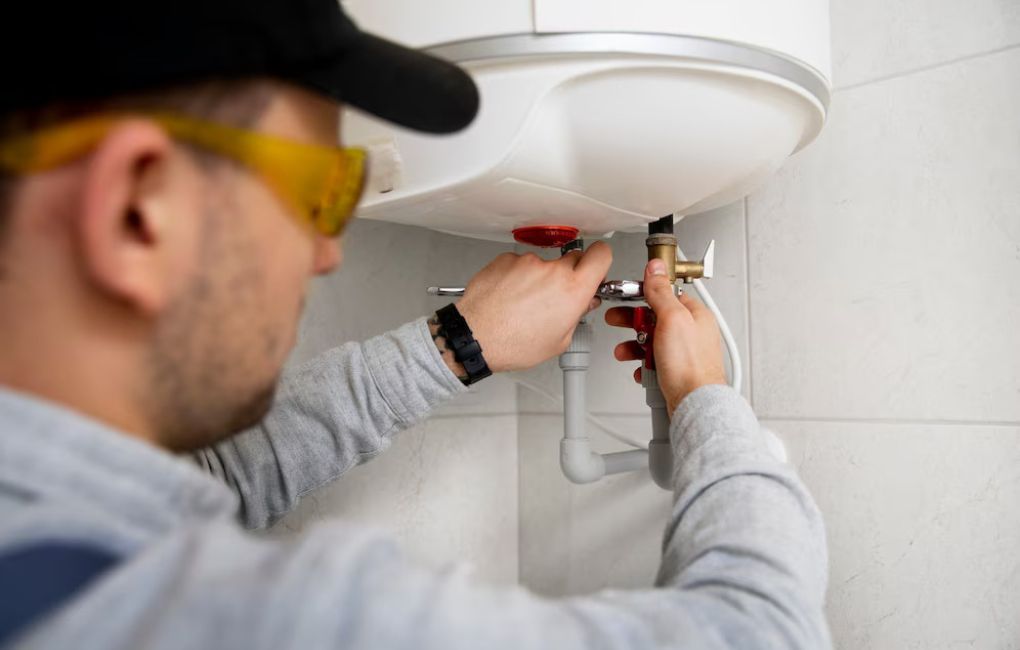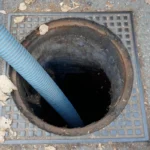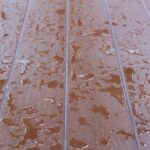Water heaters are crucial for daily activities, supplying hot water for bathing, cooking, and cleaning. Over time, they can develop problems, with leaking being a common issue. A leaking water heater, if ignored, can cause extensive damage to your home, including water damage, mold growth, and even structural deterioration.
Promptly addressing leaks is essential to prevent these severe consequences and ensure the longevity and efficiency of your water heater.
Why is My Water Heater Leaking?
Water heater leaks can stem from several causes. One common reason is a buildup of sediment at the bottom of the tank, which can corrode the tank over time and create leaks. Faulty temperature and pressure relief valves can also cause leaks if they fail to properly regulate pressure within the tank. Loose or damaged inlet and outlet connections may lead to water escaping from the pipes.
Additionally, the age of the water heater plays a significant role, as older units are more prone to wear and tear that can result in leaks. Regular maintenance and inspections can help identify and address these issues before they escalate.
Leaking Water Heater Signs
Water Puddles or Flooding
If you observe water puddles or flooding around your water heater, it signifies a leak that needs immediate attention. Carefully inspect the surrounding area, as the leak might be slow and gradual, making it less noticeable initially. Look for damp spots, rust, or corrosion on the tank and connections to identify the source of the leak. Prompt detection and repair can prevent further damage and costly repairs.
Rust or Corrosion
Rust or corrosion on the exterior of the water heater or its pipes is a clear sign of moisture accumulation. This buildup often indicates that leaks are either present or imminent, as the metal components deteriorate due to constant exposure to water.
Addressing these signs early can prevent small leaks from escalating into more significant problems, such as extensive water damage or complete system failure. Regular maintenance and inspections can help detect and mitigate these issues promptly.
Water Stains or Discoloration
Yellowish or brownish stains on walls, ceilings, or floors near the water heater are likely signs of water seepage. These stains result from water escaping the heater and causing discoloration as it seeps into surrounding materials. Identifying and addressing these stains promptly can help prevent further water damage and mold growth.
Unusual Noises
Strange noises such as dripping, gurgling, or hissing sounds from the water heater often signal a leak or pressure buildup within the system. These sounds can result from water escaping, air trapped in the pipes, or excessive pressure that needs to be released. Addressing these noises promptly is crucial to prevent further damage and ensure the safe operation of your water heater.
Increased Water Bills
A sudden spike in your water bill can be a sign of a hidden leak in your water heater or its connected pipes. Undetected leaks cause continuous water flow, leading to increased water usage and higher costs. Investigating and fixing the source of the leak promptly can help restore your water bills to normal levels and prevent further damage.
Decreased Hot Water Supply
If you notice your hot water supply dwindling faster than usual, it could indicate a leak or another issue with your water heater. This problem might be caused by water escaping from the tank or a malfunctioning heating element, reducing the amount of hot water available.
Addressing this issue promptly is essential to restore adequate hot water supply and prevent potential water damage or further deterioration of the heater. Regular maintenance can help identify and fix such problems early on.
Mineral Deposits or Scaling
Mineral buildup or scaling on the water heater’s elements or pipes can cause leaks and reduce the heater’s efficiency. Over time, these deposits restrict water flow and increase pressure, leading to potential leaks.
Additionally, scaling can hinder the heater’s ability to effectively warm water, resulting in higher energy costs and decreased performance. Regular descaling and maintenance can help prevent these issues.
Leaking Valves or Connections
Inspect the valves, connections, and fittings around the water heater for any signs of moisture or leaks. Look for dampness, water droplets, or corrosion, which can indicate potential leaks. Regularly checking these components can help detect issues early, allowing for timely repairs to prevent further damage and ensure the water heater functions efficiently.
Musty Odors or Mold
Unpleasant odors or visible mold growth near the water heater are concerning signs that suggest a leak or moisture accumulation issue. These indicators often result from water escaping the heater and fostering mold growth in the damp environment. Addressing the source of the leak promptly is crucial to prevent further water damage and potential health hazards associated with mold exposure. Additionally, proper ventilation and moisture control measures can help mitigate these issues and maintain a safe environment.
Age and Maintenance
An old water heater, typically over 10 years old, or one that hasn’t received proper maintenance, is more susceptible to leaks and issues. Over time, wear and tear can weaken the tank and components, increasing the likelihood of leaks. Regular maintenance, such as flushing the tank to remove sediment and checking for signs of corrosion, is essential to prolong the lifespan of the water heater and minimize the risk of leaks.
What to Do If You Suspect a Leak
If you notice any of these signs, take immediate action:
Turn off the water supply to the water heater: This immediate action helps prevent further water damage and ensures safety while awaiting professional assistance.
Call a professional plumber to inspect and repair or replace the water heater: A qualified plumber can accurately diagnose the issue and recommend appropriate repairs or replacement, restoring functionality to your water heater.
Check your home insurance policy for coverage: Reviewing your policy helps determine if the damages incurred are covered, potentially alleviating financial burdens associated with repair or replacement costs.
Is a Leaking Water Heater Dangerous?
A leaking water heater can pose various dangers, both immediate and long-term. In the short term, it increases the risk of water damage to your home’s structure, leading to costly repairs and potential mold growth. Additionally, leaking water heaters can create slip and fall hazards, especially if the water spreads to walkways or electrical outlets.
Moreover, if the leaking water comes into contact with electrical components, it can cause electrical hazards, increasing the risk of shocks or fires. Over time, prolonged leaks can compromise the structural integrity of the water heater and surrounding areas, leading to more extensive damage and safety concerns. Therefore, addressing a leaking water heater promptly is crucial to mitigate these dangers and ensure the safety of your home and its occupants.
How to Fix a Leaking Water Heater?
To fix a leaking water heater, start by turning off the power and water supply to the unit. Next, identify the source of the leak, which could be from the tank, pressure relief valve, or connections. Tighten loose fittings or replace damaged components as needed. If the leak persists or if there’s significant damage, contact a professional plumber for repair or replacement.
Additionally, consider enlisting the help of SS water restoration services in Prosper to address any water damage caused by the leak, ensuring thorough cleanup and restoration to prevent further issues.
FAQs
What are the signs of a leaking water heater?
Signs include puddles or flooding around the heater, dampness or water stains on nearby surfaces, rust or corrosion on the tank or pipes, strange noises like dripping or hissing, and a sudden increase in water bills.
How can I tell if my water heater is leaking if it’s hidden from view?
Look for indicators such as decreased hot water supply, moldy or musty odors near the heater, fluctuations in water temperature, or unexplained spikes in humidity levels in your home.
Is it dangerous to ignore signs of a leaking water heater?
Ignoring signs of a leaking water heater can lead to severe consequences such as water damage, mold growth, electrical hazards, and structural issues. Prompt action is crucial to mitigate these risks.
What should I do if I suspect my water heater is leaking?
Turn off the power and water supply to the heater, inspect the unit for visible signs of leaks, and contact a professional plumber for assessment and repair. Additionally, consider seeking water restoration services to address any water damage caused by the leak.
Conclusion
Recognizing the signs of a leaking water heater is crucial for preventing extensive damage and costly repairs. By immediately addressing any signs of leaks, such as puddles, dampness, or unusual noises, homeowners can mitigate potential risks and safeguard their property. Regular maintenance and inspections play a vital role in identifying and addressing issues before they escalate, thereby prolonging the lifespan of the water heater and ensuring its efficient operation.
Additionally, seeking professional assistance for repairs and considering preventive measures can contribute to maintaining a safe and secure home environment. Therefore, stay proactive and vigilant to keep your water heater in optimal condition and minimize the likelihood of leaks.






